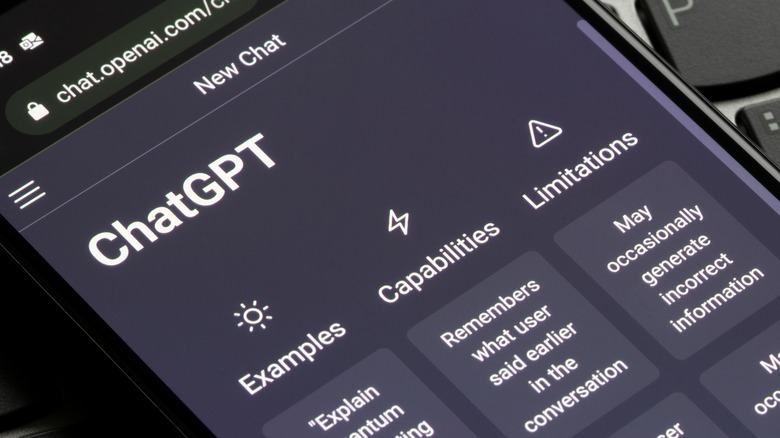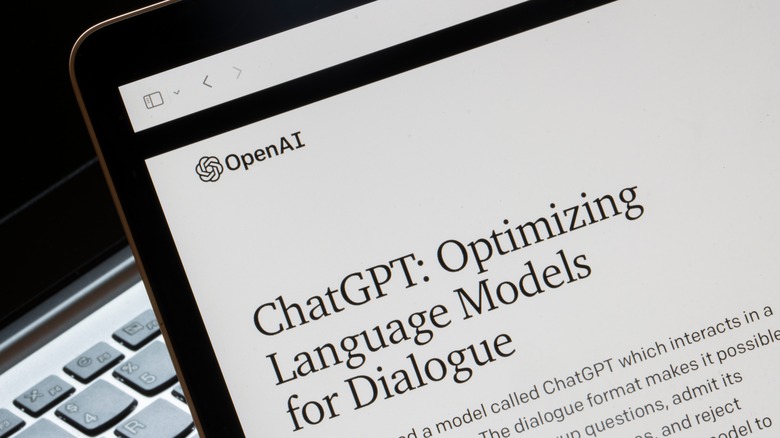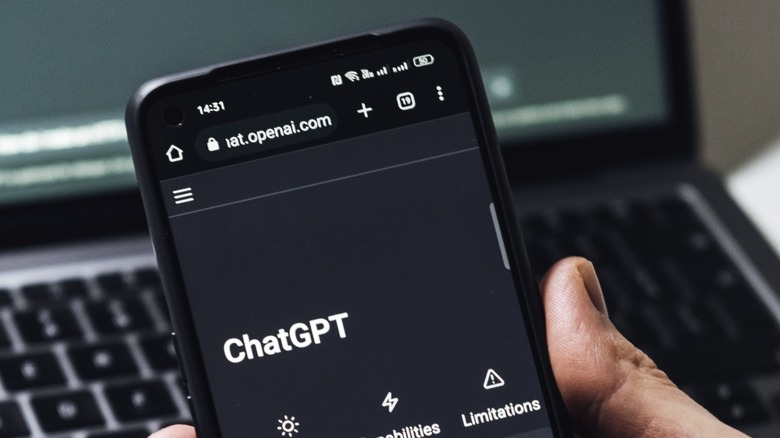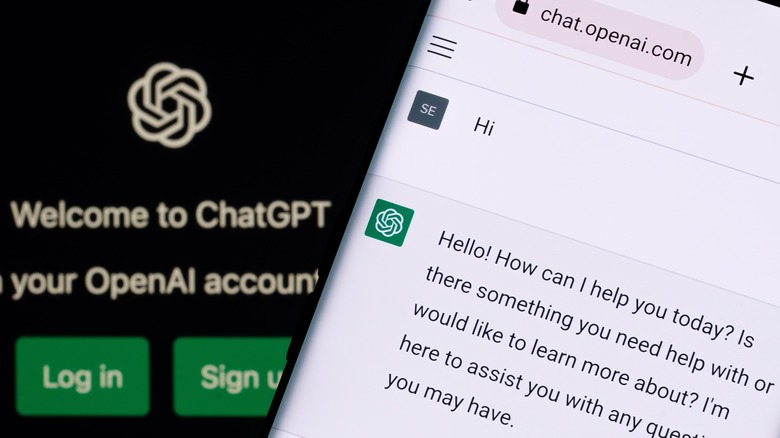Here's Why OpenAI's ChatGPT Still Has A Long Way To Go
In the past few years, no AI tool has captured mass attention with as much vigor as ChatGPT. OpenAI's program is everywhere on the internet. It's a marvel in terms of how sophisticated and verbose an AI chatbot can be, but just like every chatbot before it, ChatGPT also scrapes data from the internet. That comes with the risk of being wrong, biased, or even toxic. Stack Overflow, for example, banned it citing a "high rate of being incorrect."
The key differentiator here is that the learning model has been trained by human experts on a per-response basis, allowing it to learn as it grows its dataset. Where ChatGPT excels — or to put it more accurately, stuns — is with the flowing nature of conversations. Not only does it answer questions with an impressive level of research and linguistic sensitivity, it apparently has no limitations when it comes to subject matter diversity.
It also does a decent job of avoiding any controversial discourse that can raise eyebrows, putting well-worded disclaimer lines. It also skirts around commenting on current affairs because the training data only dates as far back as 2021. This ability to conjure up words and add them meaningfully to a sentence thread is what allows ChatGPT to serve paragraphs upon paragraphs of relevant information that would otherwise take you anywhere from minutes to hours of research to compile. But the bias is still very much there, especially when it comes to artistic and creative fields.
Testing its cinematic chops
To test ChatGPT's mettle, I reached out to Mohd Fahmeed, a filmmaker who is currently researching the impact of AI-powered tools in the industry and is also working on a short film that is almost entirely made using such tools. Fahmeed — whose short film "Ruuposh" was recently honored at the 13th International Documentary and Short Film of Kerala, Big Son International Film Festival (London, 2021), and the Luis Bunuel Memorial Awards, among others — is equal parts awe-struck and comfortably annoyed by ChatGPT.
The primary reason for that is the bias, which extends all the way from literary and cultural elements to geographical and gastronomical identities. "I've been asking it for short story ideas, and I keep getting paragraphs upon paragraphs of soul-less words that have no resemblance to my culture, language, and people." Prompts like "write me a short romantic story of two strangers who meet in a city, and fall in love" are always populated by names like John, Mark, and Sofia. The story setting is consistent in a city like Paris and Florence.
"All these names and places are alien to us, but I am served these distant settings as if they are a universal truth for story writing and film-making." The argument makes sense. "I live in a country of over 1.3 billion people, where we have nearly 700 million people who speak Hindi and nearly a billion followers of the Hindu faith. And yet, none of my characters seem Indian or even Asian. Cinema can't be that one-directional." Even after explicitly using quintessentially Indian names in the prompt, the short story or drama scene generated by ChatGPT was heavily inspired by western film and TV show tropes.
A deeply skewed worldview
But that's not the end of it. I sat with Fahmeed to diversify our options. Telling it to write a documentary film about history's five greatest "warriors," the script we got had Napoleon Bonaparte and Julius Caesar in the top three. The great Mongol emperor, Genghis Khan, was the only name that didn't originate in the western hemisphere. When asked to imagine a TV show that explores the breakfast habits of children, ChatGPT's response didn't have a single edible item that is non-American or European. Cereal was at the top. "I've never had cereal for breakfast in my entire life," says Fahmeed.
A similar prompt to conceptualize a cooking show around five global cuisines had no mention of Indian food which is a staple for $1.4 billion in just one country. Interestingly, ChatGPT put Greek cuisine in the third spot. "I don't feel a connection with any of the artistic ideas conjured by this magical program," he says. "I'm actually concerned about the lack of identity and representation in these answers, which is definitely not a good place to get creative inspiration, especially for the young minds." But it's not the lack of diversity – and the sense of alienation that comes from ChatGPT responses – that is worrying.
After all, the field of AI is no stranger to bias, and that can primarily be attributed to the type of data that goes into training it. Plus, you can't expect an AI to deliver the artistic nuances that you would get to hear between a group of filmmakers or even students chatting in a cafe. Why this is happening? This is the best I could find in a research paper: "Efforts to reduce the toxicity of LMs can reduce their ability to model text from under-represented groups, due to prejudicial correlations in the training data," says a research paper exhaustively covering InstructGPT, the sibling model to ChatGPT."
It even falters at the gates of modernity
ChatGPT also appears to miss the point in a few more alarming domains. I sat with Faheem and shot over three dozen queries comprising documentary film scripts, poems, short stories, and dialogue scenes between imaginary characters. In every single instance, the characters had heterosexual chemistry between them. Now, it's somewhat baffling to see this oddity, primarily because same-sex relations found widespread acceptance in the West, and there is plenty of material — films, TV shows, poems, and stories — centered around such relations. On the contrary, these concepts are relatively alien, and even banned, in the East.
I asked a few film students from Fahmeed's alma mater to play around with ChatGPT. "Why does ChatGPT think a man only falls in love with a woman, and they must meet in Venice or Paris to make up for good story characters?" asked one of them. "ChatGPT is good as long as you look at it as a marvel. Just don't expect it to give you cinematic or literary marvels anytime soon," Fahmeed tells me. "Also, do not hope for emotional depth, diversity, or nuance from it."
My financial analyst friend at a renowned international banking institution, who also happens to be a hopeless rom-com aficionado, labeled ChatGPT as "an unimaginative, bland well of ideas. She adds that if she had to use ChatGPT to assist with something creative like writing a book, story, or film, she would "be fuming and venting out everywhere." I won't disagree with that assessment. At best, ChatGPT seems like a good place to hunt for ideas when your creative juices are not flowing, but it won't be contending with Danny Boyle for an Emmy in the near future.



